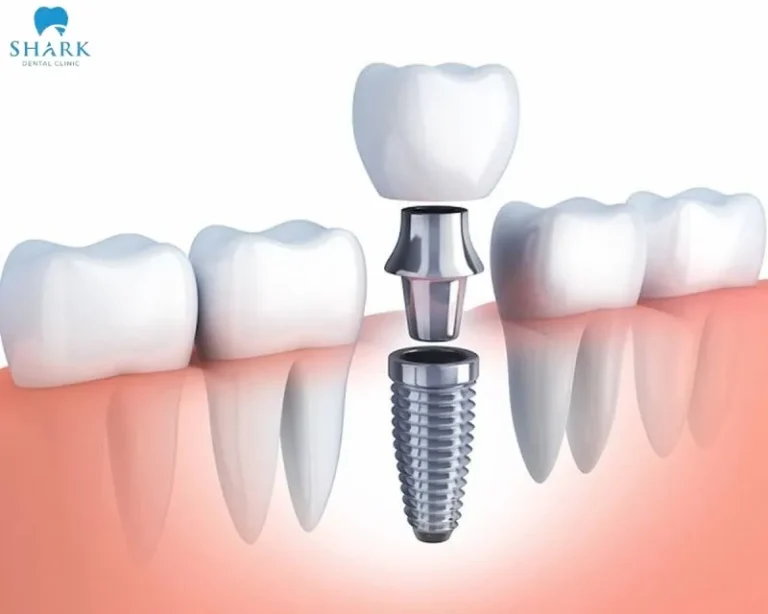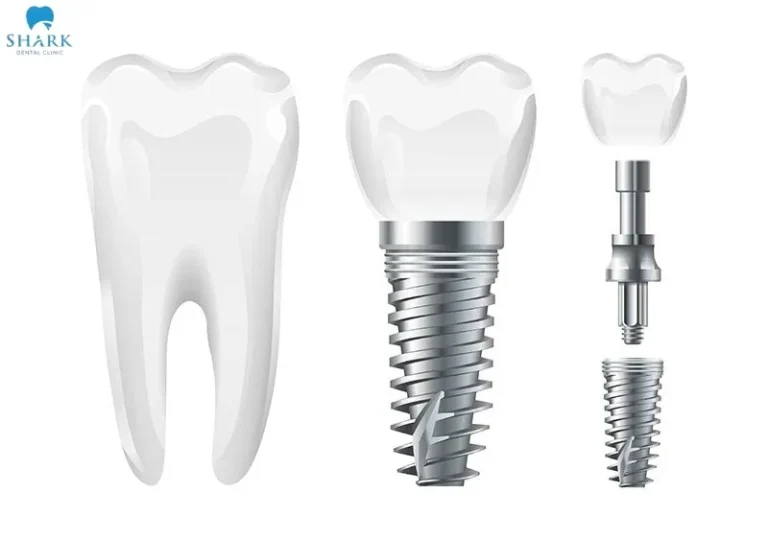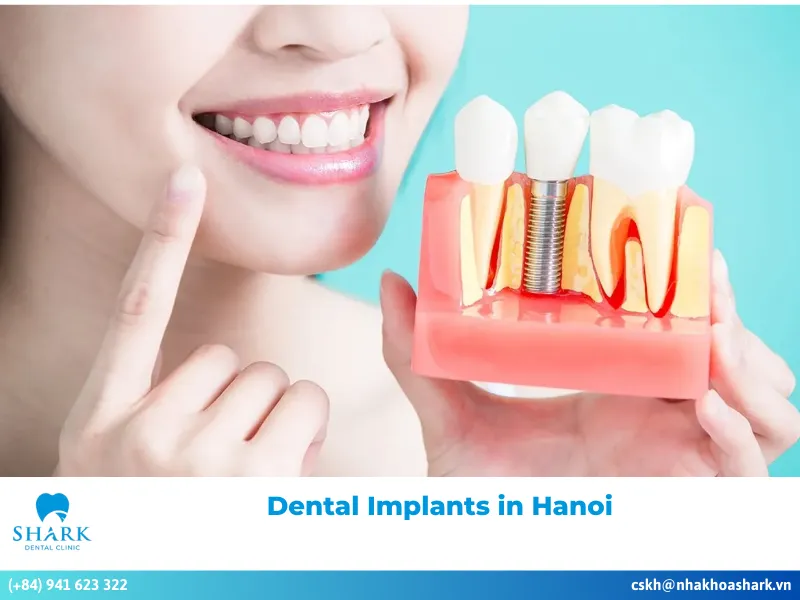Dental implants are currently the most advanced tooth restoration technique. When considering this method, patients often wonder about the longevity of a tooth implant. To provide a comprehensive answer, let’s explore the details with Shark Dental Clinic in the article below!
How long do dental implants last?
On average, dental implants last between 10 and 25 years, and in many cases, they can last a lifetime if properly cared for. However, their actual longevity depends on several factors, including the quality of the implant material, the surgical technique used, the patient’s overall health condition, and the daily oral care following the implant placement.
How long does the dental crown last?
How long can an implant-supported crown last? The porcelain crown placed on top of the implant typically lasts between 10 to 15 years, but with premium porcelain and proper care, it can even exceed 20 years.
The lifespan of a porcelain crown largely depends on the type of material used, the dentist’s expertise, and the patient’s daily eating habits and oral hygiene routine. When all these conditions are met, the porcelain crown can achieve a durability level close to that of natural teeth, providing long-term results and stability for the patient.

Do the post and abutment ever need to be replaced?
After placement, patients usually do not need to replace the implant post as they might with a dental bridge or removable denture. Over time, the implant post undergoes osseointegration with the jawbone and is capable of withstanding chewing forces. With proper care, the implant post can remain permanently in the jawbone.
However, in some cases, if the jawbone does not integrate tightly with the implant, complications such as loosening of the implant or infection may occur. In these situations, replacing the implant post might be necessary. The best course of action is to promptly visit your dentist for examination, consultation, and timely treatment.
What factors impact the lifespan of dental implants?
The question of how long dental implants last depends on several factors, including:
Quality of the implant post and porcelain crown
The quality of both the implant post and the crown is crucial for the overall lifespan of dental implants. To achieve long-lasting results, patients should choose implant materials sourced from reputable manufacturers. It is essential to avoid low-cost, poor-quality implants, as they may compromise stability and lead to serious oral health issues.

Dentist’s expertise
The skill of the dentist is vital for ensuring that the implant develops stability and lasts for many years. Implant surgery performed by an experienced dentist is smoother, safer, and more effective. Proper placement at the correct angle and position supports initial stability and creates optimal conditions for bone integration, allowing the implant to remain strong over time.
Equipment and technology used in implant placement
For implants to achieve long-term stability and durability, the dental clinic must be equipped with modern devices and advanced technology. Imaging machines provide clear diagnostic results, enabling the dentist to accurately assess the patient’s condition, perform smooth implant surgery, and minimize errors.
Condition of the patient’s jawbone
Successful implant placement requires a strong jawbone with sufficient bone density. This allows the implant to integrate effectively and maintain long-term stability. If a patient has experienced bone loss or has insufficient bone volume, the implant post may lack adequate support, increasing the risk of implant failure and infection.
Post-surgery care
Post-operative care is crucial for maintaining the lifespan of implants. Patients should practice proper oral hygiene, eliminate harmful habits, and avoid risk factors. This ensures that the implant integrates firmly with the jawbone, prevents infection or rejection, and promotes long-lasting results.

- Tham khảo: How much do Hybridge dental implants cost? Who is it suitable for?
What to expect when getting dental implants
To achieve the best treatment outcome, restore chewing function, and maintain dental aesthetics effectively when receiving dental implants, patients should keep the following points in mind.
Before implant placement
- Disclose your medical history: Inform your dentist about any underlying health conditions and medications you are taking. This information helps the dentist manage your health effectively before the surgery.
- Take dental X-rays: X-rays are essential for evaluating bone density and overall oral health, which will determine if implant placement is feasible.
- Avoid harmful habits: Refrain from consuming alcohol, beer, or tobacco before and after the implant surgery. These substances can hinder healing and increase the risk of implant rejection.
- Fasting before surgery: Patients should fast for about 6 hours before the procedure to prevent complications during anesthesia and surgery.
- Choose the right implant material: Select high-quality implant posts that suit your condition to ensure successful osseointegration and durable restoration results.

- See more: 8 Trusted and high-quality dental implant center in Ho Chi Minh, Vietnam
After implant placement
- Follow your dentist’s instructions: It is crucial to adhere strictly to your dentist’s guidance following the surgery, including oral care, prescribed medications, and scheduled follow-up visits.
- Practice proper oral hygiene: In the days after surgery, avoid brushing directly over the implant site. Instead, use a mouthwash containing Chlorhexidine to help remove plaque and prevent infection.
- Avoid strenuous activities: Your body will be sensitive post-surgery, so it is essential to rest adequately. Engaging in intense physical activity may raise blood pressure and delay healing.
- Maintain a balanced diet: Choose soft foods that are easy to chew while ensuring sufficient protein and vitamin C intake. This approach reduces chewing pressure, supports wound healing, and provides necessary energy for recovery.

Through this article, Shark Dental Clinic has provided detailed insights into how long dental implants last, along with the factors that influence their longevity. To ensure your dental implants last as long as possible, it is crucial to follow your dentist’s instructions closely, maintain regular oral hygiene, and avoid harmful factors that could compromise the durability of your implants.
- Reference: What is a one tooth implant? Key benefits of single dental implants










